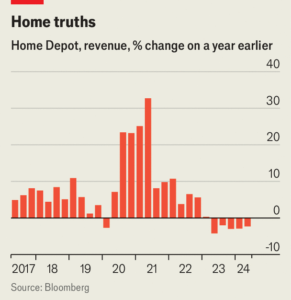
Your browser does not support the <audio> element.
It is a time-honoured tradition for bosses to grumble about the supposed laziness of their underlings. Doing so publicly, however, is rarely wise. China offers no exception to this rule. Earlier this month Qu Jing, the head of communications at Baidu, a local tech giant, took to social media to defend the company’s gruelling culture. The resulting firestorm has highlighted the growing dissatisfaction among China’s young white-collar workers with the punishing hours common in the country.
In one video, which soon went viral, Ms Qu said it was not her responsibility whether her team’s relationships or health were affected by their jobs, declaring “I’m not their mother.” In another she added that a woman who opts to spend time with “her husband and kids” should not expect a promotion or raise. She claimed that she did not regret forgetting her elder son’s birthday nor which grade her younger son was in at school because she “chose to be a career woman”. “Keep your phone on 24 hours a day, always ready to respond,” was her advice to those lucky enough to find themselves in her line of work.
Condemnation came swiftly. On May 9th Ms Qu published an apology, promising to “improve the way I communicate” and “care more for my colleagues”. A day later she stepped down. Robin Li, Baidu’s chief executive, was forced to weigh in, remarking in a staff meeting that the comments did not reflect the company’s values. Many Chinese netizens disagreed.
One noted that Ms Qu was merely “saying the quiet part out loud”. Such attitudes are widespread among leaders of the country’s tech giants. Not long ago a job at one of these firms was seen as the height of achievement for the country’s graduates. Landing a role at the likes of Baidu, Alibaba or Tencent meant prestige, a big salary, generous benefits and lucrative stock options. Even the notoriously gruelling hours did not deter applicants. Tech workers self-deprecatingly referred to themselves as “brick movers”, likening themselves to hard labourers, while boasting about the perks of their jobs.
Attitudes began to slowly change in 2019 after Jack Ma, a co-founder of Alibaba, celebrated the “blessing” of what he called the “996” work week—working from 9am to 9pm, six days a week. That set off a wave of online griping. Before long workers began to speak of “007” shifts—24 hours a day, seven days a week.
The deaths of a number of young Chinese tech workers stirred further controversy. In 2020 a 22-year-old worker at Pinduoduo, a Chinese e-commerce firm, died while travelling home from the office in the early hours of the morning. (Pinduoduo’s statement at the time did not comment on the cause of death.) In 2022 a 25-year-old content screener at Bilibili, a YouTube-like app, died while working through the Lunar New Year holiday. Later that month a 28-year-old engineer at ByteDance, the maker of TikTok and its Chinese sister-app, Douyin, died suddenly after exercising. Bilibili denied its employee had been working overtime in the week leading up to his death, but vowed to hire an additional 1,000 screeners. ByteDance did not comment on its worker’s hours. An internal survey of staff at the company soon after the incident showed that over 70% clocked off work after 9pm, with nearly 40% staying past 10pm.
More recently, a slowing economy has led many tech giants to cut costs. Perks have vanished while pay rises and promotions have been halted. Several companies have made sweeping layoffs. Employees with stock options in some companies have seen their value disappear. A regulatory crackdown by China’s government on some tech firms has not helped.
All this has eroded the appeal of working for China’s most dynamic companies. Nearly half of the country’s university graduates now aspire to work at state-owned enterprises, up from 36% in 2020, according to a survey by Zhaopin, a recruitment company. State firms have a reputation for being slow and stuffy. But they are also known as “iron rice bowls” that offer lifetime employment. Over half of the survey’s respondents cited stability as the most important factor when choosing a job. That is something the country’s tech giants are struggling to offer.
The extent to which the toxic culture of many of those firms bothers China’s central government is unclear. In 2021 the country’s top court declared that the “996” schedule was illegal. Ms Qu’s comments, however, suggest such hours are still expected of many tech workers. Her message also seems consistent with the thinking of Xi Jinping, China’s leader, who has called upon its youth to “eat bitterness”. Instead, a growing number of burned-out workers are “lying flat”, opting for apathy over ambition in their careers. In time, the cost of bosses like Ms Qu may grow clearer. ■
To stay on top of the biggest stories in business and technology, sign up to the Bottom Line, our weekly subscriber-only newsletter.















